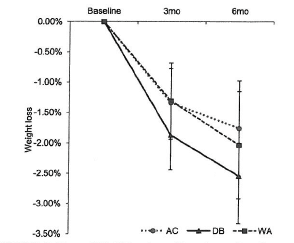
HUMAN CLINICAL TRIALS — Modest weight loss with substitution of diet products/beverages | |
| Blackburn et al, AJCN, 1997 (http://ajcn.nutrition.org/content/65/2/409.long) | |
| Overview |
|
| Results | Aspartame group lost significantly more weight overall and regained significantly less weight during maintenance [1-yr] and follow-up [2-yrs] than non-aspartame group. |
| Conclusion excerpt | “These data suggest that participation in a multidisciplinary weight-control program that includes aspartame may facilitate the long-term maintenance of reduced body weight.” |
| Peters et al, Obesity, 2014 (http://onlinelibrary.wiley.com/doi/10.1002/oby.20737/epdf) | |
| Overview |
|
| Results |
|
| Conclusion excerpt | “These results strongly suggest that NNS beverages can be part of an effective weight loss strategy and individuals who desire to consume them should not be discouraged from doing so because of concerns that they will undermine short-term weight loss efforts.” |
| Tate et al. AJCN, 2012 (“CHOICE” RCT) (http://ajcn.nutrition.org/content/95/3/555.full) | |
| Overview |
|
| Results | 
|
| Conclusion excerpt | “This strategy could have public health significance and is a simple, straightforward message.” |
| de Ruyter et al, NEJM, 2012 (http://www.nejm.org/doi/full/10.1056/NEJMoa1203034#t=article) | |
| Overview |
|
| Results | BMI, body weight, skin-fold thickness, waist-to-hip ratio, and fat mass increased significantly less in the sugar-free group. |
| Conclusion excerpt | “Masked replacement of sugar-containing beverages with non-caloric beverages reduced weight gain and fat accumulation in normal-weight children.” |
| Ebbeling et al, NEJM, 2012 (http://www.nejm.org/doi/full/10.1056/NEJMoa1203388#t=article) | |
| Overview |
|
| Results |
|
| Conclusion excerpt | “Replacement of sugar-sweetened beverages with non-caloric beverages did not improve body weight over a 2-year period, but group differences in dietary quality and body weight were observed at the end of the 1-year intervention period.” |
LITERATURE REVIEWS – Body of human trials confirm potential benefit | |
| Zheng et al, JAND 2015 (http://www.andjrnl.org/article/S2212-2672(15)00112-4/abstract) | |
| Overview | Systematic review of prospective cohort and RCT’s examining effects of substituting beverage alternatives for SSBs on long-term health outcomes in children and adults. |
| Conclusion excerpt | “The overall consensus of our review was that SSB substitution with beverage alternatives such as water and low-calorie beverages may have beneficial effects on long-term body weight management.” |
| Academy of Nutrition and Dietetics EAL 2009; Reiterated JAND Position Paper 2012 (http://bit.ly/1L6SRXx ) | |
| Question | In adults, does using foods or beverages with aspartame in an energy restricted or ad libitum diet affect energy balance (weight)? |
| Conclusion statement (Grade 1) | “Use of aspartame and aspartame-sweetened products as part of a comprehensive weight loss or maintenance program by individuals may be associated with greater weight loss and may assist individuals with weight maintenance over time.” |
| Miller & Perez, AJCN, 2014 (http://ajcn.nutrition.org/content/early/2014/06/18/ajcn.113.082826.full.pdf+html) | |
| Overview | Meta-analysis of 15 RCT and 9 prospective cohort studies examined the relation between low-calorie sweeteners (from foods, beverages, or table top sweeteners) and body weight and composition. |
| Findings |
|
| Conclusion excerpt | “Data from RCT’s, which provide the highest quality of evidence for examining the potentially causal effects of LCS intake, indicate that substituting LCS options for their regular-calorie versions results in a modest weight loss, and may be a useful dietary tool to improve compliance with weight loss or weight maintenance plans.” |
| Mattes and Popkin, AJCN, 2009 (http://ajcn.nutrition.org/content/89/1/1.full.pdf+html) | |
| Overview | Comprehensive review on appetite, food intake and related mechanisms. (224 research studies referenced) |
| Results |
|
| Conclusion excerpt | “. . . if nonnutritive sweeteners are used as substitutes for higher-energy-yielding sweeteners, they have the potential to aid in weight management.” |
| De la Hunty et al, Brit Nutr J, 2006 (http://bit.ly/1qDGepO) | |
| Overview | Meta-analysis (16 studies) on the effect of aspartame on weight loss, weight maintenance and energy intakes in adults; addresses the question of energy compensation and whether the use of aspartame-sweetened foods and drinks is an effective way to lose weight. |
| Results | The meta-analysis demonstrates that using foods and drinks sweetened with aspartame instead of sucrose results in a significant reduction in both energy intakes and bodyweight. |
| Conclusion excerpt | “This review has shown that using foods and drinks sweetened with aspartame instead of those sweetened with sucrose is an effective way to maintain and lose weight without reducing the palatability of the diet.” |
OBSERVATIONAL | |
| Mozaffarian et al, NEJM, 2011 (http://bit.ly/1OjsXAH) | |
| Overview |
|
| Results | Large scale epidemiological studies that controlled for reverse causality; showed neutral to beneficial effect of diet soda on body weight. |
| Conclusion excerpt | “Our findings suggest that both individual and population-based strategies to help people consume fewer calories may be most effective when particular foods and beverages are targeted for decreased (or increased) consumption.” |
OTHER | |
| National Weight Control Registry | Catenacci et al, Obesity J, 2014 (http://onlinelibrary.wiley.com/doi/10.1002/oby.20834/abstract) |
| Overview |
|
| Results | Regular consumption of low/no calorie sweetened beverages is common in successful weight loss maintainers for various reasons including helping individuals to limit total energy intake. |
| Conclusion excerpt | ”Changing beverage consumption patterns was felt to be very important for weight loss and maintenance by a substantial percentage of successful weight loss maintainers in the National Weight Control Registry.” |